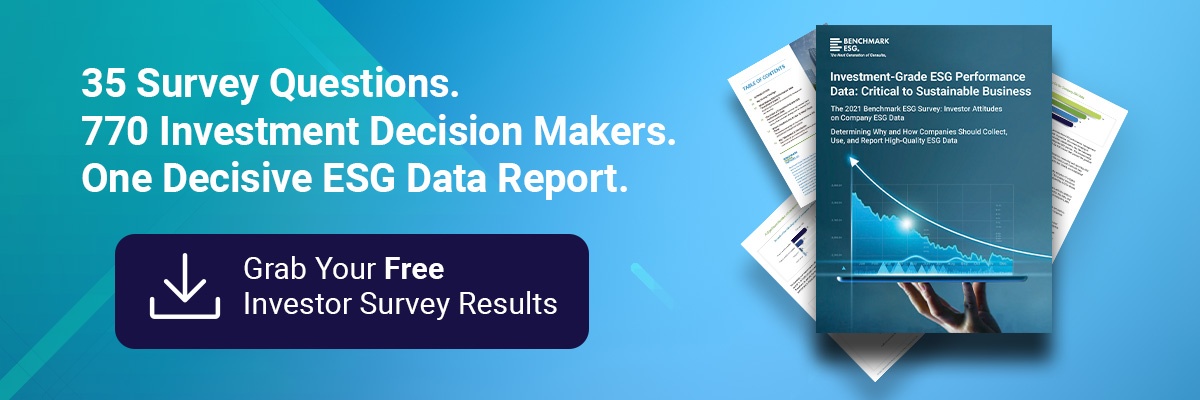Traditionally the fundamental driver behind stock market investment has been the assessment of the financial performance of a stock. Sustainable investing, however, is becoming a mainstream evaluation mechanism influencing investment decisions across financial markets. Investors are conscious of companies’ effect on the environment, people, and communities in which they operate. Through various engagement avenues, investors are looking to hold companies accountable to integrate sustainable business practices within their operations and be transparent about said practices through adherence to global ESG reporting frameworks such as GRI, SASB, TCFD, and others. Companies that demonstrate strong sustainability performance, a forward-looking strategy, and an agile ESG risk mitigation mechanism, will score high on investors’ assessments, assuring them ROI on sustainability.
Recently, BlackRock, the world’s largest asset manager, sent a clear message on the future of Sustainable Investment within its 2020 annual letter to CEOs. The letter, titled “A Fundamental Reshaping of Finance,” outlines BlackRock CEO Larry Fink’s beliefs that climate change will cause a transformative reallocation of capital towards sustainable investments. “Awareness is rapidly changing, and I believe we are on the edge of a fundamental reshaping of finance,” he writes. Climate risk is now being viewed as investment risk, and investors are increasingly demanding that companies establish a strong strategy to minimize and mitigate these risks.
Sustainability’s Impact on Organizations
Early-stage investments in sustainability have increased over the past three years, and that trend is predicted to continue. According to research by Frankfurt, Germany-based Deutsche Bank, stocks that reported positive climate change news outperformed the MSCI World Index by 0.8% over the study’s one-year period. Companies with negative news related to climate change, on the other hand, underperformed by 0.3%. This is a clear indication that markets are closely monitoring and reacting instantly to organizations’ actions and efforts to tackle climate change and other related ESG related risks.
Additionally, some popular companies are presented with greater access to capital due to their dedication to developing ESG-focused products & services. The electric vehicle and clean energy company Tesla strives to be a leading figure in creating a zero-emission future for our current fossil fuel–reliant world. This sustainability focus has contributed to more revenue opportunities to support the company’s growth. In 2009, Tesla received a USD 465 million loan from the U.S. Department of Energy as part of the Advanced Technology Vehicles Manufacturing Loan Program (ATVM). The Advanced Technology Vehicles Manufacturing (AVTM) Loan Program is funding was part of a $25 billion direct loan program passed by Congress in fall 2008 to provide debt capital to the U.S. automotive industry to fund projects that help them manufacture vehicles in the U.S. that meet higher mileage requirements and reduce the country’s dependence on foreign oil. In turn, Tesla offered $17 shares on the NASDAQ and raised more than USD 226 million. Additionally, in December, real estate investment trust Invitation Homes also jumped in with a $3.5 billion credit facility in collaboration with BBVA. the loan adjusted based on the REIT’s score by the Global Real Estate Sustainability Benchmark, or GRESB.

Invest in the Future
Sustainable investment is about investing in the future: improving the way we do business and encouraging organizations to contribute to creating a sustainable future. Many companies are responding to this transformative aegis by incorporating ESG into their operational targets, and they continue making bigger commitments to the cause:
- Salesforce: Support the conservation and restoration of 100 million trees over the next decade.
- Microsoft: Become carbon negative by 2030.
- Starbucks: Reduce carbon emissions by 50% by 2030, and conserve 50% of water usage on direct operations and coffee production.
Sustaining Performance & Measuring Success
Establishing ESG commitments is the easy part. Translating those commitments to practical and validated reality and quantifying the impact and return on investment is the real challenge. Those organizations that can implement their objectives throughout their functional operations will succeed and sustain. This can be enabled through robust digital systems that connect high-level performance targets (metrics) to the operational process level where sustainability-related initiatives and activities produce the impact. 45% of companies stated they are measuring the ROI on sustainability activities which proves that the number of companies who are failing to measure and quantify the impacts of their sustainability work is substantial. In addition to measurements, a quarter of companies cannot see the correlation to revenue from said sustainability programs.
How Benchmark Gensuite® Supports Business Practices that Will Net You ROI on Sustainability Investment
Need help driving and measuring ESG and sustainability goals? For nearly two decades, Benchmark Gensuite®‘s one-of-a-kind applications have enabled operational excellence and risk reduction in the environment, safety, sustainability, risk and quality, product stewardship, and responsible sourcing. Create a future focused on sustainability and holistic ESG at your core. Visit our website to see how we can help you invest in the future!



